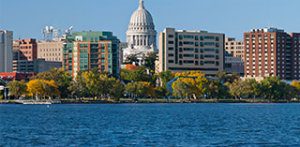Navigability Bill Gets Hearing, Questions
AB599/SB506 would impact across Wisconsin, though written for a single project, and some legislators question if it’s needed
December 4, 2017
By Wisconsin Lakes staff
Tuesday, November 28 proved to be a busy day in the Capitol as both Senate and Assembly committees held public hearings on a bill that would restrict the WI Dept of Natural Resources’s ability to declare some impoundments navigable.
The bill, AB599 in the Assembly and SB506 in the Senate, would restrict the DNR from declaring navigable an impoundment of a stream or portion of a stream that was previously declared non-navigable and is part of an environmental restoration effort. The impoundment would also be exempt from many environmental protections including Ch 30 regulations on placement of structures, deposits, and dredging of navigable waters, shoreland zoning, wetland zoning, stormwater management zoning, and construction site erosion control.
What was presumed prior to the hearing became explicit upon testimony – the bill was largely written at the behest of a single constituent to benefit a single project, though the bill’s authors conceded it would have statewide impact. Ignoring questions of constitutionality (the bill may run afoul of Wisconsin’s public trust doctrine) and the rights of downstream property owners, the authors asserted the need for certainty for private landowners to be willing to personally fund restoration projects if they desired to deny public access to the restored waters.
 Wisconsin Lakes testified against the proposal, objecting not only on constitutional grounds, but also to the statewide application of a fix for a specific citizen, and to the potential harm to downstream waters and property owners on those waters.
Wisconsin Lakes testified against the proposal, objecting not only on constitutional grounds, but also to the statewide application of a fix for a specific citizen, and to the potential harm to downstream waters and property owners on those waters.
The project for which the bill is designed to help is in itself a commendable one. The landowner is restoring the impoundment and intends to open it to disabled veterans in need of the quiet and solace that time on and near water can provide, an idea supported by the #BlueMind movement discussed by Dr. Wallace J. Nichols last April at the Lakes Partnership Convention. One major concern expressed by the veterans at the hearings was the need for private space, and there is worry that a navigable declaration would allow anglers to travel up the stream to the impoundment, which the landowner also manages as a walleye farm to provide stock for fishing. Public intrusion on the lake could decimate that stock and destroy the solace of the area for veterans, proponents of the bill argued.
Wisconsin Lakes applauded the efforts to create this space on the water for veterans, but believes that the landowner and the Dept. of Natural Resources, who has not yet even declared the stream in question navigable, should be able to work out an agreement sufficient to allow the program to continue, without the need for a bill of statewide application that leaves numerous questions unanswered and invites countless unintended consequences. Indeed, several lawmakers at the hearings questioned the need for a bill when DNR testified that there is no current plan to change this particular navigability determination.
Neither committee, as of the time of writing, had scheduled votes on the bill, a necessary step before the measure can be voted on by the full Legislature. Wisconsin Lakes continues to monitor the legislation.
WISCONSIN LAKES POSITION: OPPOSED

